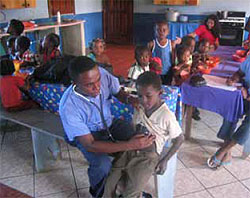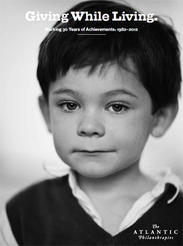Training Socially Committed Physicians for the World’s Most Vulnerable Communities
Resource type: Grantee Story
Gail Reed, MEDICC’s co-founder, speaks at TEDMED about the unique mission of Cuba’s Latin American Medical School.

Dr. Castillo examines a young patient. Photo: C. Gorry, MEDICC
After graduating from Cuba’s Latin American Medical School (ELAM) in 2005, Dr. Luther Castillo, a young Honduran of Garifuna heritage, and his medical school classmates began fulfilling their promise to provide health care to people in communities with limited care. Atlantic grantees helped them build the first hospital in the remote village of Ciriboya, providing the Garifuna people with two firsts: accessible comprehensive health services and electricity. Since 2007, 10 ELAM-trained doctors have treated over 175,000 cases in the region.
ELAM, the world’s largest medical school, trains future doctors in primary, preventive care with the best of public health medicine. ELAM has graduated 10,000 low-income international doctors, largely from developing countries. Currently, 21,000 ELAM students from more than 30 countries are on full scholarship. In return for their education, they pledge to practice in their under-serviced communities. To prepare these students to address health disparities, they learn Cuba’s approach to health care, which is highly effective in communities with few resources.
“When a hurricane hit my country in 1998, Cuban doctors were right there with us, among the poorest of the poor,” said Dr. Castillo. “They taught us never to abandon anybody, and they’re the reason I’m a doctor today… ELAM has given all of us the chance to pass on that solidarity.”
After the 2010 Haiti earthquake, Dr. Castillo led 600 ELAM graduates from 24 countries, including Haiti, who served as first responders. Many remain there staffing public health clinics equipped by Global Links and MEDICC, Atlantic grantees. To identify volunteers, ELAM used its Observatory, an online communications network funded by the Atlantic Charitable Trust (ACT), to stay linked to and evaluate its graduates’ impact in their home countries.
ACT and Atlantic have dramatically improved ELAM’s education. ACT support has helped modernise computer laboratories, enhance Internet connectivity at the central campus, introduce clinical skills laboratories, upgrade sciences laboratories and refurbish libraries at provincial universities where students take their clinical training. Atlantic grants have provided graduates with “backpack libraries” of textbooks and medical instruments to use in remote settings. Dr. Castillo explains: “When I go on foot to visit my patients… the backpack is with me, it’s like having my professors at my side.”
Finally, MEDICC programmes have led to higher success rates on medical boards and residency placements for 200 ELAM students and graduates. Moreover, the grantee links them with mentors and socially committed U.S. health institutions, streamlining their path to work in underserved communities.
ACT and Atlantic have invested $12.6 million in ELAM since 2002, enriching the medical education of over 31,000 low-income and socially committed international students. They touch the lives of more than 23 million people in the Americas, Africa and Asia.
Giving While Living: Marking 30 Years of Achievements: 1982–2012
> Read more stories of impact in our 30th anniversary publication
Global Links and Medical Education Cooperation with Cuba are also Atlantic grantees working on training medical professionals.
